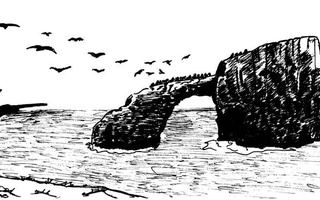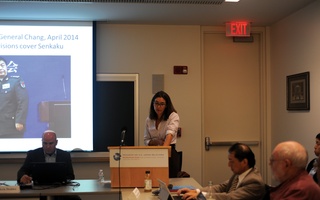They’d been born The Unicorns; they were reincarnated as Islands. Traces of their past life are scattered throughout their third album, “Vapours,” and the ebb and flow of these remnants shape a strange topography; the result lies somewhere in between the new and the old and meshes the two in a vaguely discordant harmony. Islands’ predecessors, The Unicorns, released only one LP in their short lifespan: 2003’s critically-acclaimed work of uniquely sweet synth-pop, “Who Will Cut Our Hair When We’re Gone?” The songs were expansive and luminous masterpieces, eschewing traditional chorus-verse patterns; instead they meshed phrases and instrumentals into confidently organic art. This technique was best exemplified on that album’s most popular track, “Jellybones,” a sparse electronic backbone slowly layered with drumbeats and high, breathy vocals; it was broken briefly by sudden semi-silence, then slipped slowly into not-choruses and not-bridges. The song, and the album itself, dipped indiepop in molten, sugary experimentation. The Unicorns broke up in 2004, but co-frontmen Jaime Thomspon and Nick Thornburn came together soon after to create Islands. “Return to the Sea,” their first album under this new moniker, was released in 2006. It seemed like a natural progression for them. Though it sounded similar, Islands still managed to get inventive, sampling hip-hop and country. It too was well-received, pleasing anxious fans of The Unicorns. But with their second effort, 2008’s “Arm’s Way,” and, most recently, “Vapours,” Islands seems to be moving away from their roots and toward a simpler future; instead of growing they’ve regressed. “Switched On,” for example, is supremely listenable, a song for driving down wooded roads at twilight, windows open, singing casually. The drums start off naked, soon clothed by the high, sweet vocals: “I’ve put on something you can’t switch off”—lyrics vague but cemented in prepositional wordplay. The synth-pop then vaporizes; it is replaced instead by forgettable, whiny lyrics and a typical chorus-verse structure; the uncomfortable dichotomy between past and present resurfaces. Islands once meshed diverse genres with ease, but here they seem unable to merge the slightest structural varieties. Track two, “No You Don’t,” is tainted by the same malaise: as the first single, it oozes with catchiness—but this masks its banality. Its initial simplicity and subsequent slide into a fuller, guitar-heavy phrase is promising; but the utilitarian electronic droplets cascading through the background, coupled with a lack of emotion, flattens the piece. And though the vocals rise high in tone at some points, the volume remains fairly equalized. Such lack of emphasis on any one part kills the piece’s potential arch; without this growth and dénouement, we learn nothing. This cycle of promise and disappointment, however, is broken when the sugarcoated elements collide with the newfound thematic darkness. Simple, major key guitar chords create upbeat melodies—but when paired with the chill of lyrics like “uncross my arms to disarm the car bomb,” the song offers a strange fusion. More fascinating still is when the dark, lo-fi “Shining”—shaded by a slow, monotonous melody and the thick bramble of guitar—meets the sweet introductory swell of “On Foreigners,” a swell shaped by a gradual crescendo of soft, high-pitched voices. This contrast creates for “Vapours” a varied landscape, highs and lows often absent from individual tracks; the album captures the arch the songs lack. “Vapours,” then, edges on success. But Islands’ yesterdays fuse poorly with their todays; moments of harmony are often broken by harsh dissonance. Perhaps without the context of The Unicorns and the expectations set by “Who Will Cut Our Hair When We’re Gone?” the notes would flow more smoothly, but the bones of the past do and will resurface in the present; Islands merely needs to embrace them.
Read more in Arts
Author on Le Corbusier ChronicleRecommended Articles
-
 Boyle Predicts a Dark Future 'When the Killing's Done'
Boyle Predicts a Dark Future 'When the Killing's Done' -
Not Your Island ParadiseI have a lot to be thankful for—unlike many of my friends from home, my parents are not part of the 32 percent of the CNMI’s population who may lose their legal status on Nov. 28.
-
 Daylight Saving Time
Daylight Saving Time -
 Get Out: Columbus Day
Get Out: Columbus Day -
Why Asia Needs AmericaWar in Asia would serve no one’s interests—not America’s, not Asia’s, and least of all China’s and Japan’s.
-
 Historian Discusses Pacific Ocean Territorial Disputes
Historian Discusses Pacific Ocean Territorial Disputes













